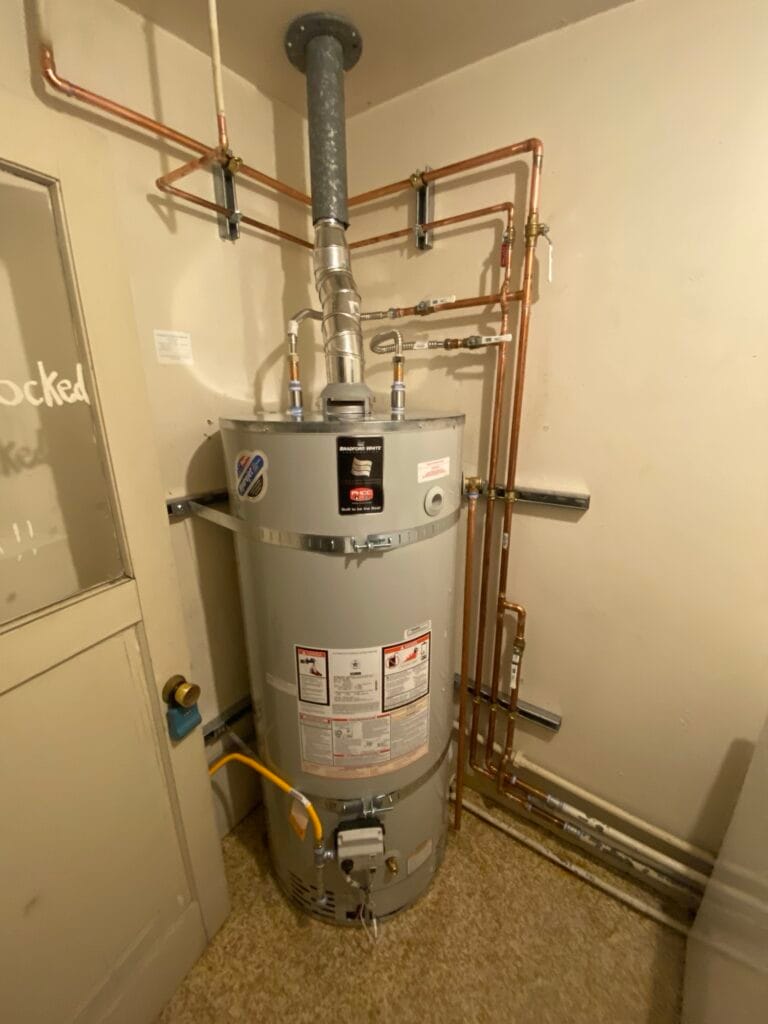
A broken water heater can quickly disrupt your home life—no hot showers, inefficient appliances, and rising utility bills. When your unit stops working properly, you’re faced with a critical decision: Should you repair it or replace it entirely?
At Wade’s Plumbing & Septic, we help homeowners across Santa Cruz County make informed, cost-effective choices about their plumbing systems. Here’s what you need to know about diagnosing water heater issues, estimating repair costs, and deciding whether it’s time for an upgrade.
How Long Does a Water Heater Last?
Most traditional water heaters have a life expectancy of 10 to 15 years. That lifespan can vary depending on factors like:
- The location of the water heater (e.g., inside, garage, or outside)
- Water quality and hardness levels
- How well the unit has been maintained over time
- The quality of the initial installation
If your water heater is approaching the 10-year mark and showing signs of failure, replacement might be the most cost-effective route.
Key Signs You May Need a New Water Heater
- Water pooling around the base of the tank
- Inconsistent hot water or long heating times
- Rusty or discolored hot water from faucets
- Unusual noises like popping or rumbling
- Visible rust or corrosion on the tank
- Frequent repair needs or high maintenance costs
The 50% Rule: A Simple Repair vs. Replace Test
Use the 50% rule as a cost-benefit guide:
If the cost of repairs equals or exceeds 50% of the cost of a new water heater, it’s time to replace it.
Even if repair costs fall under 50%, consider:
- The unit’s age
- How often it breaks down
- The energy efficiency of your current system
An older, inefficient water heater may still be costing you more in the long run, even if it can be fixed temporarily.
Benefits of Replacing Your Water Heater
Over time, minerals in your water supply cause sediment buildup, leading to tank corrosion and eventual leaks. When the tank itself fails, replacement is the only option. Fortunately, new water heater models offer several benefits:
- Improved energy efficiency, reducing monthly utility bills
- Advanced corrosion resistance, with modern glass-lined tanks
- Faster recovery times and more consistent hot water supply
- More size and model options, including tankless systems
Upgrade to Energy-Efficient Options
Today’s market offers a variety of advanced systems that may qualify for federal tax credits and deliver substantial savings over time:
- Tankless water heaters – Heat water on demand, offering unlimited hot water and lower standby energy losses
- Heat pump water heaters – Extract heat from the air to warm water, using up to 60% less electricity
- Solar water heaters – Use sunlight to preheat or heat your water, offering long-term energy savings and eco-benefits
Though these options often require a higher upfront investment, many homeowners find the long-term energy savings and rebates make them well worth the upgrade.
Water Heater Repair: When It’s Still Worth Fixing
If your unit is under 8–10 years old and in decent condition, repair might be the smarter option. Regular maintenance and small repairs can keep your system running efficiently.
Here are a few key maintenance and repair tips:
- Flush the tank annually to remove sediment and prevent corrosion
- Test the pressure relief valve by lifting the lever—if no water discharges, it may need replacement
- Set the thermostat to 120°F to avoid overheating and extend the tank’s lifespan
- Check for leaks at connections—not all leaks mean the tank is bad; fittings or valves can often be repaired
If the tank itself is leaking, however, replacement is typically required, as internal damage cannot be repaired.
Prevent Water Heater Problems With Regular Maintenance
No matter your decision—repair or replacement—routine maintenance is the key to maximizing the lifespan of your unit. Flushing the tank, checking valves, and adjusting temperature settings help prevent corrosion, overheating, and efficiency loss.
At Wade’s Plumbing & Septic, we offer water heater inspections, repairs, replacements, and annual maintenance to keep your system running reliably for years to come.
Choosing the Right Water Heater for Your Home
If replacement is the best option, we can help you select a system that fits your home’s size, water usage, energy goals, and budget. We install and service:
- Traditional tank water heaters (gas or electric)
- Tankless on-demand systems
- Hybrid/heat pump water heaters
- High-efficiency and ENERGY STAR® certified models
Let us walk you through the options, explain the benefits, and install the perfect system with expert precision.
Don’t Let a Failing Water Heater Leave You Cold
If your water heater is underperforming, leaking, or due for replacement, don’t wait for a total failure. Contact Wade’s Plumbing & Septic for expert diagnosis, honest advice, and fast, professional service.
We proudly serve homes throughout Santa Cruz, Capitola, Soquel, Aptos, Watsonville, and surrounding areas with trusted plumbing expertise.
Need Help?
Contact us for a free quote or to schedule service.
Need Help?
Contact us for a free quote or to schedule service.
Comments (0)